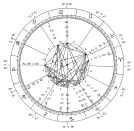Financial astrology
| Astrology |
|---|
 New millennium astrological chart |
| Background |
| Traditions |
| Branches |
|
|
Financial astrology (also known as business astrology, economic astrology, and/or astro-economics) is the practice of relating the movements of celestial bodies to events in financial markets. The use of astrology in financial markets is not consistent with standard economic or financial theory, but might be considered heterodox economics. The practice has been used in various formats since 463BC.[1]
The scientific community considers astrology to be a pseudoscience. Hard dates are rarely given, rather, advice is given based on which astrological sign is 'rising'. Long term predictions are made using more traditional methods of looking at prior history and making mathematical predictions based on patterns relative to astronomical events.[2][3] Critics have pointed out that some astrological events that have been used in predictions occur so rarely that they may have never happened before within a human lifetime, thus having no precedent on which to predict results.[3]
In 1992, 1994 and 2008, a magazine by the name of Wall Street Forecaster was named as one of the top forecasters on Wall Street, as the superstition was being leaned on for luck.[4][5] It was also rated the second best performing forecaster in 2002.[4] It was reported that some clients asked for their copies to be delivered in 'brown paper' to avoid mockery.[5] As of 2001 the Astro fund trading company, which handled $3.5-5 million worth of investor assets, claimed 10-15% of fund managers were using their service or a similar company.[6] The majority of the market demand for this service has come from the US and Japan respectively.[7] In 2000, Bloomberg News was host to a weekly show dedicated to financial astrology.[7] The 2000 financial crash led to a surge in companies and investment bankers using the services of financial astrologers.[8][9]
Tellingly, large firms such as J. P. Morgan, refuse to take a stance for or against the practice, though the founder of the bank, John Pierpont Morgan, had a personal astrologer on staff, and he was attributed as saying "Millionaires don't use astrologers, but billionaires do.".[10][11][12] In 2000, the chief technical analyst for HSBC was quoted as saying; "most astrology stuff doesn't check out, but some of it does".[9] Similarly, in 1997, the treasurer for The European Bank for Reconstruction and Development admitted that they used the practice in their financial planning and described the correlation between astrological events and financial events as "uncanny".[13]
The practice was used by Goldman Sachs in a paper released in 1999, focussing specifically on the correlation between eclipses and the state of the financial market at that time. Though floated as an idea by the company at the time, analysis showed that random data produced similar results.[14] A 2007 study by The British Association for the Advancement of Science conducted an experiment wherein a financial astrology, professional investor, and five-year-old child, were asked to invest £5,000 on the FTSE100. The child earned the most money, with the financial astrologer taking the heaviest losses.[15]
References
- ↑ Slotsky, Alice Louise (1997). The Bourse of Babylon: Market Quotations in the Astronomical Diaries of Babylonia. Michigan: UMI Dissertation Services. ISBN 1883053420.
- ↑ Starich, Karen (May 30, 2012). "Financial Astrology: The Key to Future Investing". Benzinga. Retrieved January 12, 2015.
- 1 2 Inthirarajah, Arul (August 15, 1992). "How to read the planets". Business Times. Singapore.
- 1 2 Storr, Will (December 1, 2013). "Could the stars predict the markets?; The position of the planets doesn't make a share price plummet. Or does it? This is what 'financial astrologers' claim -- and many traders believe them, finds Will Storr". The Sunday Telegraph. London. pp. 14–15.
- 1 2 Anchor: Deborah Norville (January 9, 1994). "Investors Look to Stars for Guidance". Event occurs at 6pm EST. CBS. CBS Evening News. Missing or empty
|series=(help) - ↑ "Managers Turn in to Horoscope Know-How; Wall Street Stars: Astrologers Forecast a Heavenly Return". Birmingham Post. March 17, 2001. p. 28.
- 1 2 Lee, Sandra (August 5, 2000). "Star advice for kooky investors". The Daily Telegraph. Sydney, Australia. p. 33.
- ↑ Jarvis, David (February 8, 2009). "The stars rescue our banks". Sunday Express. p. 21.
- 1 2 Krantz, Matt (May 26, 2000). "Stars above! Some investors seeking astrological guidance -- really". USA Today. p. 1B.
- ↑ Kleinfield, N.R. (May 15, 1988). "Seeing Dollar Signs In Searching the Stars". The New York Times. p. Section 3; Page 1, Column 2; Financial Desk.
- ↑ Blackburn, Caroline (May 9, 2004). "Financial Express Your Money More and More Investors are Beginning to Think Astrology can Light up the Path to Profits, says Caroline Blackburn; Look at the Stars to Seek out a Fortune.". Sunday Express. p. 16.
- ↑ Kanaley, Reid (October 15, 1999). "Market's Future is in the Stars, Prognosticator says Robert Hitt uses his Interest in Astrology to Predict the Stock Market. He says the Heavens Foretell a Continuing Decline in Prices until May 5.". The Philadelphia Inquirer. p. C01.
- ↑ Lodge, Steve (March 30, 1997). "Jump clear of the market when Mars enters Libra; pounds 10bn worth of investment funds are influenced by astrology". The Independent. London. p. 15.
- ↑ Bulsara, Hament (March 18, 2001). "If Crystal Ball is Cloudy, Just Turn to the Stars". The Toronto Star.
- ↑ "Star fad takes the pisces". The Sun. England. June 26, 2007.